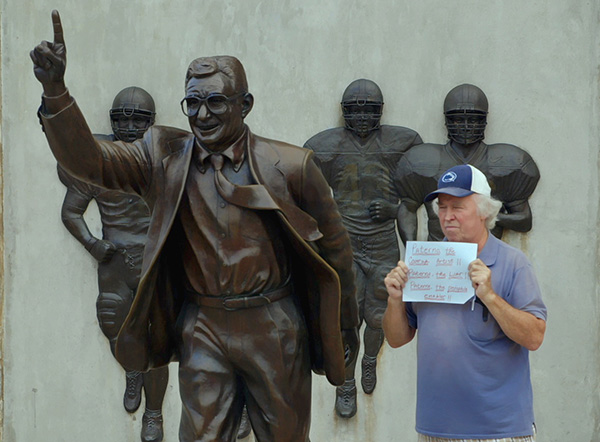Movie review by Greg Carlson
While there is an abundance of hero worship on display in Amir Bar-Lev’s raw and riveting documentary “Happy Valley,” the most courageous figure to emerge from the wreckage and devastation caused by the Jerry Sandusky case at Penn State is Sandusky’s adopted son Matt. For any number of possible reasons, Matt is the only person victimized by Jerry Sandusky to appear in the movie, and each time he speaks, Bar-Lev refocuses attention on the grim truth: the lives of many children and families were shattered by the monstrous actions of a serial child molester. In 2012, Sandusky was found guilty of 45 counts of sexual abuse of young boys and was subsequently sentenced to 30 to 60 years in prison for his crimes.
“Happy Valley,” however, is not a movie that digs into the specifics of the criminal proceedings leveled at Sandusky. Instead, Bar-Lev uses the case as an inciting incident to examine the ways in which a variety of communities with competing interests and investments come together and are torn apart. The movie does make an argument that the passionate football fans of the Nittany Lions showed in their desire to exonerate venerated football coach Joe Paterno a stunning lack of perspective regarding Sandusky’s victims, but that viewpoint may not be emphatic enough.
Bar-Lev recognizes the challenges of addressing the relationship between Paterno and retired assistant coach Sandusky, and while the filmmaker shows old footage of an interview in which both men appear, the suggestion that Paterno was indifferent to — or even disliked — Sandusky precedes the questions of how much Paterno knew and for how long. “Happy Valley” spends significant time with Paterno’s wife Suzanne and two of their children, sons Jay and Scott, and while the film aspires to a kind of journalistic objectivity, Paterno is treated with respect, if not kid gloves, by the filmmaker.
While Paterno’s legacy emerges as one of the movie’s central themes, Bar-Lev juggles a head-spinning number of fascinating subplots and side trips, each of which could sustain a film. These topics are naturally interrelated, from the perceived severity/lack of severity of the NCAA sanctions to the unruly crowds that blame the media for hastening Paterno’s exit and physical decline. Only brief mention is made of the ouster of Penn State president Graham Spanier, senior vice president for finance and business Gary Schultz, and athletic director Tim Curley, possibly due to the ongoing and still unfolding events (something that prevents the document from achieving a full sense of closure).
One of the film’s most intense sequences takes place outside Beaver Stadium at the site of Angelo Di Maria’s bronze statue of Joe Paterno, where a man holding a small hand-written sign that reads “Paterno, the Cover-Up Artist! Paterno, the Liar! Paterno, the Pedophile Enabler!” verbally and physically clashes with several angry people. During the intensely uncomfortable confrontations, Bar-Lev cuts to the sky, where a plane pulls a banner stating “Take the statue down or we will.” The chaotic scene, complete with finger pointing and heated arguments, captures the bizarre culture that develops when something as sacred as big-budget collegiate football is challenged. The statue, of course, was removed and placed into storage, but plans by alumni acting independently from the university are underway to unveil a new statue of Paterno, a few miles from the stadium, in November of 2015.
